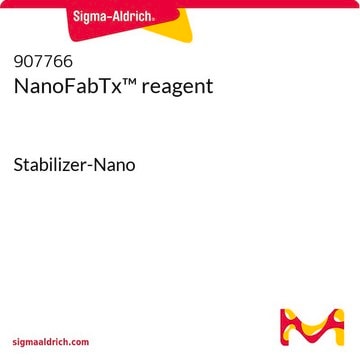918881
NanoFabTx™ PEG-PCL drug formulation screening kit
for synthesis of PEGylated nanoparticles
Synonym(s):
Drug delivery reagent kit, NanoFabTx reagent kit, Nanoparticle synthesis kit, PEG-PCL
About This Item
Recommended Products
description
Drug loading screening kit, for synthesis of PEGylated PCL nanoparticles
Kit components :
PEGPCL-L(915203-500mg)
PEGPCL-H(912549-500mg)
PEGPCL-UH (917788-500mg)
Stabilizer-Nano (907766-5g)
Quality Level
application(s)
advanced drug delivery
storage temp.
2-8°C
Related Categories
General description
- A Nanoprecipitation protocol to prepare drug-encapsulated nanoparticles in standard laboratory glassware.
- A Microfluidics protocol using commercial platforms or syringe pumps.
Application
Features and Benefits
- Ready-to-use nanoformulation kit for PEGylated PCL nanoparticles
- Choose from either nanoprecipitation or microfluidics-based protocols
- Create specifically sized, biodegradable, PEGylated PCL nanoparticles
- Maximize the encapsulation of hydrophobic drugs
- Three different PEGylated PCLs are included
Legal Information
related product
Storage Class
10 - Combustible liquids
Certificates of Analysis (COA)
Search for Certificates of Analysis (COA) by entering the products Lot/Batch Number. Lot and Batch Numbers can be found on a product’s label following the words ‘Lot’ or ‘Batch’.
Already Own This Product?
Find documentation for the products that you have recently purchased in the Document Library.
Articles
NanoFabTx™ platform accelerates drug development with ready-to-use formulations and microfluidic devices for particle synthesis.
NanoFabTX kits enable precise drug delivery with lipid nanoparticles and liposomes for mRNA and nucleic acids.
Professor Robert K. Prud’homme introduces flash nanoprecipitation (FNP) for nanoparticle fabrication, which is a scalable, rapid mixing process for nanoparticle formulations.
Our team of scientists has experience in all areas of research including Life Science, Material Science, Chemical Synthesis, Chromatography, Analytical and many others.
Contact Technical Service





